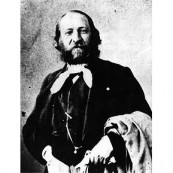Composers
Sebastián Iradier Salaverri (Salaberri) (20 January 1809 – 6 December 1865),[1] a.k.a. Sebastián Yradier, was a Spanish composer.
Iradier was born in Lanciego, in the province of Álava. His publisher in Paris urged him to "universalize" his name, from Iradier to Yradier. He is known primarily for his habaneras, especially the one titled "La Paloma", written around 1860 after a visit to Cuba. "La Paloma" was extremely popular in both Spain and America (especially Mexico), where it was responsible for the great popularity achieved by the habanera.
A collection of 25 of Iradier's most popular songs was published in Paris in 1864, with French words, as Fleurs d'Espagne.[2]
Another of Iradier's compositions is "El Arreglito", a habanera used by Georges Bizet in his opera Carmen as a source of inspiration. Bizet, thinking it was a folk song, was inspired by the melody of "El Arreglito" and recomposed what is known today as the "Habanera" from Carmen: the aria "L'amour est un oiseau rebelle" which is very close, melodically, to "El Arreglito". When he discovered his mistake, Bizet added a note to the vocal score of the opera, acknowledging its source.[2]
Iradier died in obscurity in 1865.
Two of Iradier's songs are extremely well known, all over the world. One of them, as mentioned before, is "El Arreglito", which Bizet re-arranged (the melody is copied, almost verbatim) into the "Habanera," arguably the best known and most often interpreted aria from the opera Carmen. His other well known song, La Paloma, is also an habanera. The UNAM Radio (Universidad Nacional Autónoma de México) pointed out that there are more than one thousand versions of this song, and that together with "Yesterday" by the Beatles, is one of the most recorded songs in the history of music.
Refine by search
view all| Country: | Spain |
| Period: | Romantique |
Biography
Sebastián Iradier Salaverri (Salaberri) (20 January 1809 – 6 December 1865),[1] a.k.a. Sebastián Yradier, was a Spanish composer.
Iradier was born in Lanciego, in the province of Álava. His publisher in Paris urged him to "universalize" his name, from Iradier to Yradier. He is known primarily for his habaneras, especially the one titled "La Paloma", written around 1860 after a visit to Cuba. "La Paloma" was extremely popular in both Spain and America (especially Mexico), where it was responsible for the great popularity achieved by the habanera.
A collection of 25 of Iradier's most popular songs was published in Paris in 1864, with French words, as Fleurs d'Espagne.[2]
Another of Iradier's compositions is "El Arreglito", a habanera used by Georges Bizet in his opera Carmen as a source of inspiration. Bizet, thinking it was a folk song, was inspired by the melody of "El Arreglito" and recomposed what is known today as the "Habanera" from Carmen: the aria "L'amour est un oiseau rebelle" which is very close, melodically, to "El Arreglito". When he discovered his mistake, Bizet added a note to the vocal score of the opera, acknowledging its source.[2]
Iradier died in obscurity in 1865.
Two of Iradier's songs are extremely well known, all over the world. One of them, as mentioned before, is "El Arreglito", which Bizet re-arranged (the melody is copied, almost verbatim) into the "Habanera," arguably the best known and most often interpreted aria from the opera Carmen. His other well known song, La Paloma, is also an habanera. The UNAM Radio (Universidad Nacional Autónoma de México) pointed out that there are more than one thousand versions of this song, and that together with "Yesterday" by the Beatles, is one of the most recorded songs in the history of music.



![Great Voices Of The Century - Sopranos, The Greatest Arias [CD2 of 4]](http://static.classicalm.com/repository/collection-cover/small/1402-img1403277217686408.jpg)